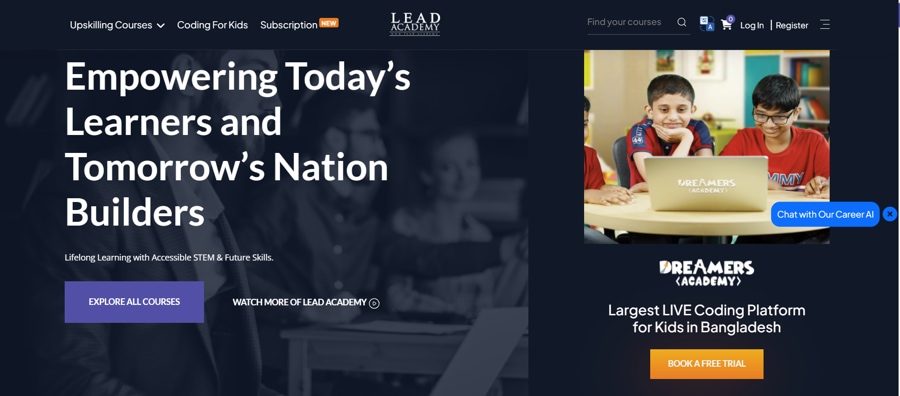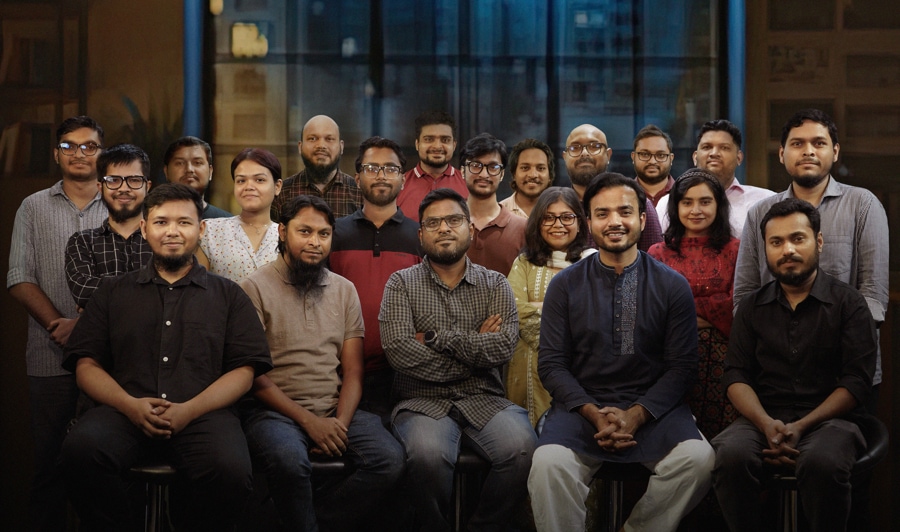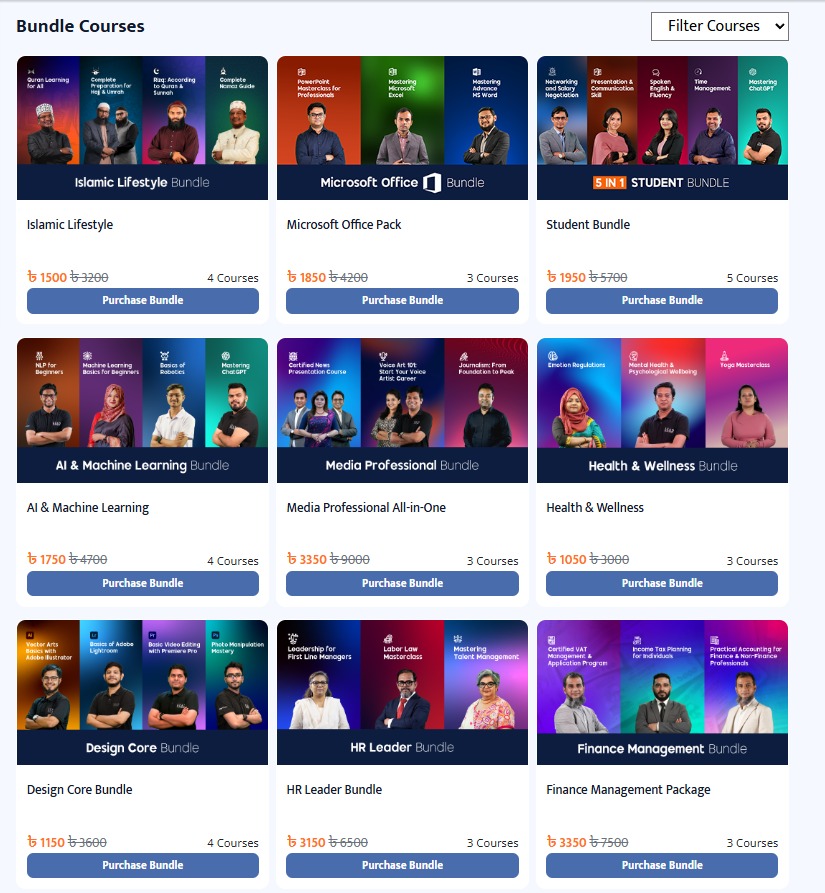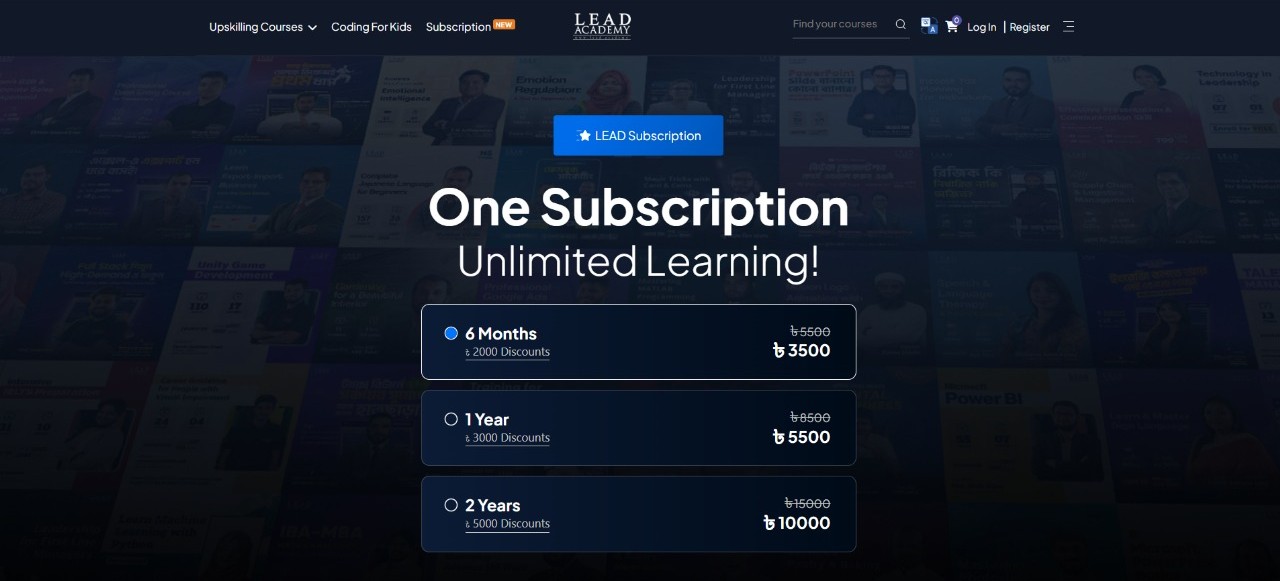
In a country poised at the cusp of a demographic dividend, Bangladesh faces a pressing challenge: an education system struggling to keep pace with the demands of a rapidly evolving global economy.
With a population of over 170 million, 70% of whom reside in rural areas, the country grapples with a significant gap between academic training and industry needs, a lack of structured technology education, and limited opportunities for underserved groups, including people with disabilities.
Enter Lead Academy, a Dhaka-based edtech startup that has emerged as an important player, addressing some of these systemic challenges with a unique model that prioritizes quality, accessibility, and impact. Founded by Ashfaq Zaman, a UK-educated education enthusiast, and Sharif Ahmed, a software engineer turned entrepreneur, Lead Academy blends high quality and industry-aligned curricula, cutting-edge technology, and a deep commitment to inclusivity.
This article explores how Lead Academy has crafted a distinctive approach to delivering high-quality online education, setting itself apart in a growing and crowded market.
Lead Academy’s origin story is rooted in a clear-eyed recognition of Bangladesh’s educational pain points. Ashfaq Zaman, who spent his formative years in the UK before returning to Bangladesh, identified three core problems.
First, there is a persistent disconnect between academia and industry, leaving graduates under-prepared for the skills demanded by employers.
Second, the absence of structured platforms for timely upskilling limits professionals’ ability to stay competitive in a fast-changing job market.
Third, technology education, particularly coding and STEM (Science, Technology, Engineering, and Mathematics), is virtually nonexistent at the school level, especially in public institutions, leaving young learners ill-equipped for a tech-driven world.
These gaps are compounded by the exclusion of people with disabilities, who face near-total barriers to education and employment.
Zaman’s vision for Lead Academy was born from a belief that education is the “passport to the future” and a determinant of a nation’s trajectory. After returning from the UK, he joined forces with his childhood friend and co-founder Sharif Ahmed to start Lead Academy.
Lead began with a focus on higher education, training over 1,500 university faculties across Bangladesh in modern pedagogy, activity-based learning, and flipped classroom models through a World Bank-funded Institutional Quality Assurance Cell (IQAC) program.
However, the COVID-19 pandemic changed the company, prompting a pivot to online learning. It began with pre-recorded courses and then expanded into K1–K12 STEM education through its subsidiary Dreamers Academy, creating a comprehensive platform that covers the full learning lifecycle. The promise—best quality online education in Bangladesh.

Delivering quality education online is a challenge. Most online education confuses information delivery with learning, chasing engagement, time on platform, course completions, monthly active users, and so on. The assumption is that more engagement equals better learning. But none of these solve the core challenge: how do you ensure that someone who completes a course can actually perform the skills they supposedly learned?
Ashfaq Zaman, Lead's co-founder, experienced this gap firsthand. After training 1,500 university faculty members across Bangladesh through IQAC programs, he watched graduates enter the workforce completely under-prepared for the professional world of work. The universities taught theory. The job market demanded practical skills. The gap between the two was growing wider every year.
Traditional solutions focus on the wrong end of the problem, trying to make content more engaging, accessible, and gamified. But engagement without learning is just entertainment.
Lead took a different approach: working backwards from desired outcomes. The company started with the assumption that quality education produces measurable real-world outcomes, and everything else is just vanity metrics.
Three years later, the company has built a comprehensive educational platform, serving 55,000 learners with a 60% course completion rate and demonstrable job placement success.

Here's how most EdTech companies think about quality:
Lead Academy reversed this process:
While this seems obvious, it's remarkably rare in practice. It requires answering uncomfortable questions: What exactly should a student be able to do after completing this course? How will we verify they can actually do it? How will we know if they can apply these skills in real-world contexts?
Most EdTech companies avoid these questions because they're difficult to answer and expensive to implement.
Lead Academy has built its entire business model around answering them. The company sought to engineer a system to solve four common failures in the education market:
The credibility gap: Certificates from online courses are noise. Employers ignore them. To address the credibility gap, the company works with experienced instructors (7-8 yrs min. experience) teaching job-specific skills, issues blockchain-verified certificates and granular skill assessments. This means employers trust credentials, which in turn incentivize new learners to seek out Lead.
The completion gap: 95%+ of learners abandon MOOCs. Lead has built a layered accountability stack to solve the completion gap. The AI—powered personalization allows for real-time skill mapping, personalized learning paths, and reduces abandonment. Human oversight via student relationship managers track progress and intervene at drop-off points. Finally, lock-ins through interactive project-based milestones creates momentum. Outcome: 60% course completion. Completion isn’t motivation-driven; it’s a system output. Remove friction, add accountability, and completion rises.
The localization void: Global platforms can’t address Bangladesh’s unique constraints (infrastructure, language, jobs). Bangladesh’s barriers aren’t flaws to fix — they are design constraints: low bandwidth, device access, intermittent electricity. To tackle these challenges, Lead offers a mobile-first, low-data video streaming platform and the company says it is working on an upcoming offline download capability. The company treats infrastructure gaps as inputs, not obstacles. This has turned localization from a cost center into a moat.
The inclusion blindspot: Disabled and rural learners are excluded by design. In partnership with NGOs (Friendship), Lead has scaled its solution to chars (coastal areas) and places like Cox’s Bazar, providing coding education to underprivileged children, particularly girls. Lead designed for the hardest cases first. Sign language courses, screen-reader compatible LMS for blind/deaf learners. Speech therapy/cognitive modules for autistic children. Solving edge cases forced robust UX design.
Lead Academy’s definition of quality education is both ambitious and nuanced, designed to meet the needs of diverse learners while aligning with global standards. Ultimately, quality is measured by impact: jobs landed, skills gained, and lives transformed, from remote coastal children learning to code to alumni founding startups. Lead Academy's approach rests on several interconnected pillars, each addressing a different aspect of the quality problem:
The first pillar tackles the authority problem. Who should create educational content? Most platforms optimize for cost and availability, leading to a race to the bottom in instructor quality.
Lead Academy established rigid selection criteria:
This ensures that course creators have actually solved the problems they're teaching others to solve. The difference between theoretical knowledge and practical expertise is enormous, and it shows up immediately in content quality.
But expertise alone isn't enough. Domain experts sometimes make terrible teachers. Lead Academy addresses this through its content development process. Industry experts work with the product team to validate course outlines against real market needs. Theoretical concepts are paired with practical case studies and real-world scenarios. And each course receives film-level production treatment, because visual quality directly impacts learning effectiveness.

Lead Academy’s curriculum design process is equally meticulous, ensuring alignment with industry needs and learner expectations. Market research informs course outlines, while feedback from the student community shapes content during planning. The design process involves a product development team, industry expert instructors, and a dedicated editors’ team, ensuring clarity and relevance.
Courses are revised every six months based on feedback, with new content added annually to keep pace with industry trends. Theoretical content is balanced with practical applications, pairing concepts with real-world examples to enhance applicability. To maintain local relevance, instructors with on-the-ground experience design content, supplemented by continuous market research.
How do employers know that someone who completed an online course actually learned the material? Most platforms issue certificates that prove completion, not competence. Lead Academy built a blockchain-based credentialing system that verifies specific skills rather than course completion.
Here's how it works: Instead of "John completed the Accounting course," employers can verify "John scored 85% on tax preparation, 92% on VAT calculations, and 78% on chart of accounts management." The credential breaks down competency by specific skill areas, giving employers granular insight into what someone can actually do.
This system creates powerful incentives. Students can't game their way to credentials—they have to demonstrate actual competence. Instructors can't create superficial content—it has to produce measurable skill development. The entire system aligns around learning outcomes rather than completion metrics.
The final pillar tackles the consistency problem. How do you maintain quality standards across hundreds of courses and thousands of students?
Lead Academy’s quality assurance framework involves pre-review, editing, post-review, and community feedback, third-party audits, and community review groups, creating a continuous improvement loop. Student success is tracked through feedback, LinkedIn monitoring, ratings, reviews, and success stories.
Each stage has specific criteria and checkpoints. Content can't move to the next stage without meeting quality standards. This creates a systematic approach to quality that doesn't depend on individual judgment or motivation.
This relentless focus on quality has created a growing series of success stories. Children from remote coastal schools, supported by the Friendship NGO, are learning to code; alumni are founding startups and nonprofits; and graduates are pursuing global STEM careers. And winning at competitions such as ICT Olympiad and NASA Space Olympiad.
Quality education isn't one-size-fits-all. Quality education also has to address the personalized learning challenge. But most personalization attempts focus on content recommendation rather than learning optimization. Lead Academy built their personalization around learning effectiveness by applying the power of AI. AI tracks learning velocity of students and adjusts content delivery speed, helps identify knowledge gaps and provides targeted remediation, matches learning paths to specific job requirements, and AI chatbots provide immediate help while human mentors handle complex issues.
Personalization should optimize for learning outcomes, not engagement metrics. Sometimes the most effective learning experience is challenging and uncomfortable. Good personalization systems should be able to push students when they need pushing, not just give them what they want.

Most quality-first approaches fail because they don't scale economically. High-touch, outcome-focused education seems incompatible with profitable unit economics. Lead Academy solved this through strategic automation and partnerships.
AI handles routine tasks (progress tracking, basic Q&A, content recommendation) while human experts focus on high-value interactions (complex problem-solving, career guidance, skill assessment).
Instead of pure direct-to-consumer scaling, the company works with NGOs, schools, and corporations to distribute its courses. This reduces customer acquisition costs while increasing impact.
Lead was first in Bangladesh to offer true subscription access to its full course catalog, creating predictable revenue while giving students flexibility.
Looking ahead, Lead Academy aims to continue to expand its Bangladesh operation while looking to opportunities to expand globally. Over the next five years, the platform aims to serve half a million learners. On the product side, plans include more advanced AI personalization, and a blockchain-backed hiring ecosystem to further synchronize learner and employer needs. Inclusive education will remain a priority, with expanded offerings for people with disabilities and underserved communities.
To scale quality, Lead Academy will automate quality assurance with AI, maintain low mentor-learner ratios, and strengthen customer support and community engagement. Partnerships with trusted institutions will enable the platform to reach remote areas, empowering girls and orphans with coding and English skills.
As Mr. Ashfaque puts it, the ultimate ambition is a future-of-work-ready Bangladesh, with a workforce equipped for the Fourth Industrial Revolution and competitive on the global stage.

What's interesting about Lead Academy is the broader pattern it represents. The company chose to compete on quality in an industry that typically competes on price and convenience. This choice forced the company to develop different capabilities. Systematic quality assurance instead of viral marketing. Outcome measurement instead of engagement optimization. Expert networks instead of content volume. Verification systems instead of completion certificates. These capabilities are harder to build but more defensible once established. They create sustainable competitive advantages that can't be easily copied.
Lead Academy's growth suggests several important lessons for the broader EdTech industry.
Engagement metrics are easy to game but don't correlate with learning. Outcome metrics are harder to measure but create sustainable competitive advantages.
Content scales through replication, quality scales through systematic processes and intelligent automation. Most EdTech companies try to scale content and hope quality follows. It doesn't work.
Employers don't trust online credentials because most don't verify actual competence. Platforms that solve the verification problem can charge premium prices and create network effects.
And finally, serving populations that others ignore often creates more sustainable businesses than competing for mainstream audiences.
Cover photo: Ashfaq Zaman & Sharif Ahmed, Founders of Lead Academy (from Left to Right)
